Abortion and reproductive rights
A collection of documents and articles related to abortion and reproductive rights policy and campaigns from a number of organisations in the archive.
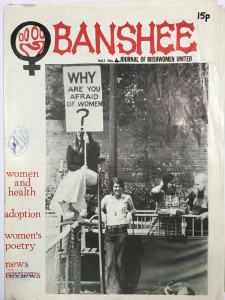
Banshee, Vol. 1, No. 4 (1976)
Irish Women United
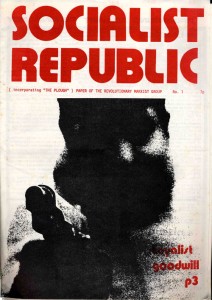
Socialist Republic, No. 1 (1975)
Revolutionary Marxist Group
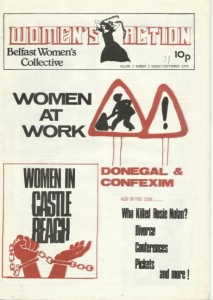
Women's Action, Vol. 2, No. 3 (1978)
Belfast Women's Collective
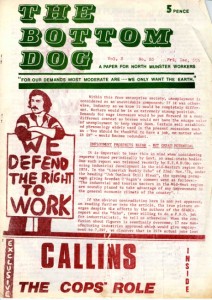
The Bottom Dog, Vol. 3, No. 53 (1975)
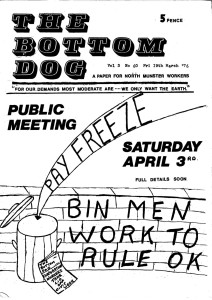
The Bottom Dog, Vol. 3, No. 60 (1976)
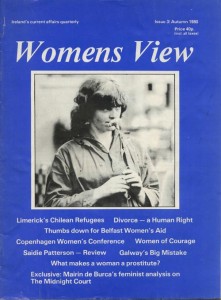
Women's View, No. 3 (1980)
Sinn Féin The Workers' Party
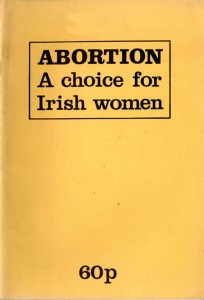
Abortion: A Choice for Irish Women (1981)
Irish Woman's Right to Choose Group
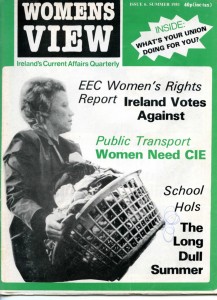
Women's View, No. 6 (1981)
Sinn Féin The Workers' Party
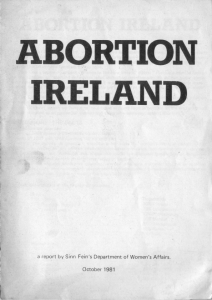
Abortion Ireland (1981)
Sinn Féin
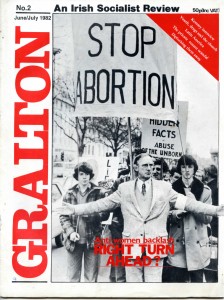
Gralton, No. 2 (1982)
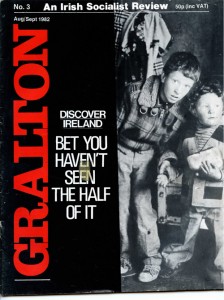
Gralton, No. 3 (1982)
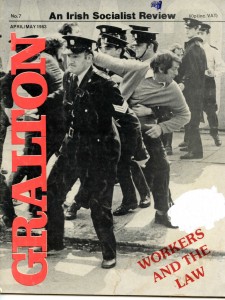
Gralton, No. 7 (1983)
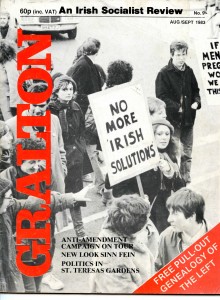
Gralton, No. 9 (1983)
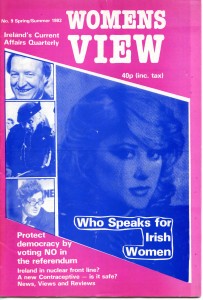
Women's View, No. 9 (1983)
The Workers' Party
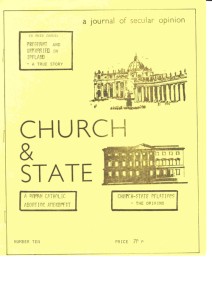
Church and State, No. 10 (1982)
Athol Books
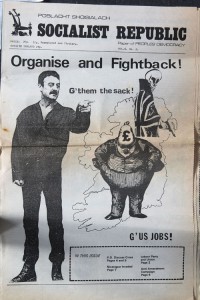
Socialist Republic, Vol. 6, No. 2 (1983)
People's Democracy
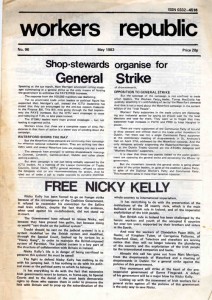
Workers' Republic, No. 96 (1983)
League for a Workers Republic
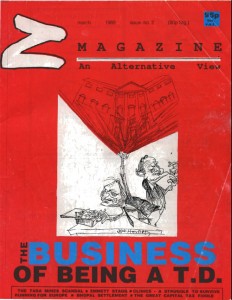
Z Magazine, No. 2 (1989)
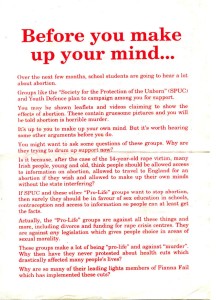
Before you make up your mind... (1992)
Socialist Workers' Movement
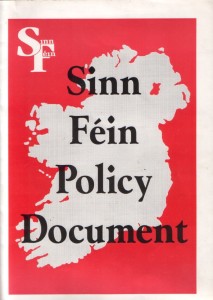
Sinn Féin Policy Document (1994 c.)
Sinn Féin
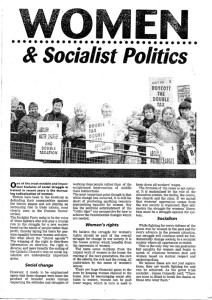
Women & Socialist Politics (1998)
Socialist Party
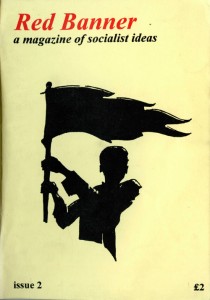
Red Banner, No. 2 (1998)
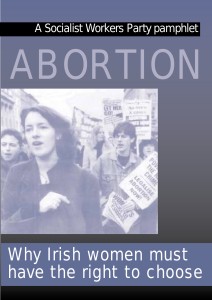
Abortion: Why Irish Women Must Have the Right to Choose (2002)
Socialist Workers' Party
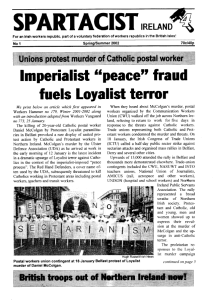
Spartacist Ireland, No. 1 (2002)
Spartacist Group Ireland
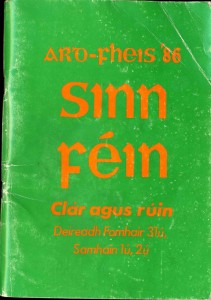
Sinn Féin Ard Fheis '86: Clár agus Rúin (1986)
Sinn Féin
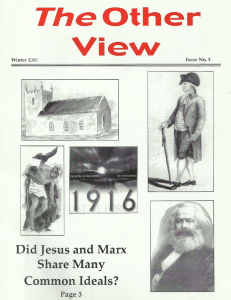
The Other View, No. 3 (2000)
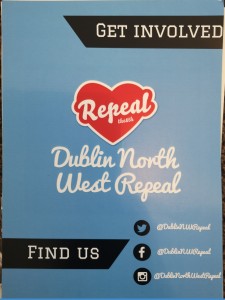
Repeal the Eighth - Dublin North West Repeal (2017)
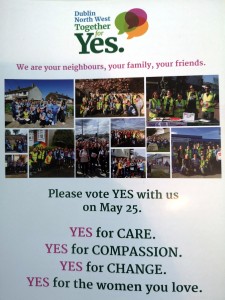
Please Vote YES With Us on May 25 (2018)
Together for Yes
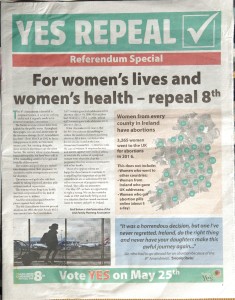
Yes Repeal (2018)
Trade Union Campaign to Repeal the Eighth Amendment
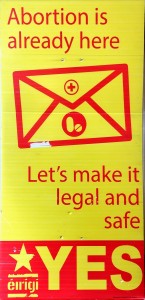
Abortion Is Already Here, Let's Make it Legal and Safe (2018)
Éirígí
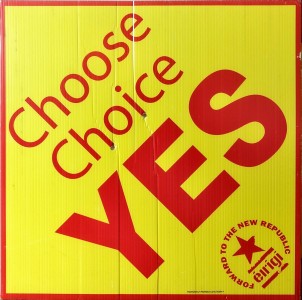
Choose Choice: Yes (2018)
Éirígí
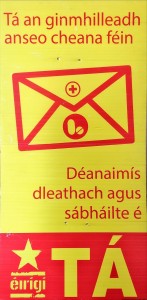
Tá an Ginmhilleadh Anseo Cheana Féin: Déanaimís Dleathach agus Sábháilte É (2018)
Éirígí
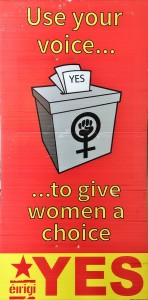
Use Your Voice to Give Women A Choice (2018)
Éirígí
About this Collection
This collection presents some of the documents and articles in the archive relating to reproductive rights campaigns through the years. While abortion is often the most prominent of these issues, for much of the time period covered by the archive, access to contraception and information were equally salient.
It is not intended to provide a complete historical outline of reproductive rights issues in Ireland, but to highlight the coverage of these issues in the archive1. Materials are grouped chronologically below, and direct links provided to the relevant page in the document PDF.
1970s
Irish Women United (IWU) was formed in 1975 and included access to contraception and abortion prominently in their charter, which is reproduced on the back page of each issue of their magazine, Banshee.
Free Legal Contraception:Banshee, No. 4, p. 16
- State financed birth-control clinics
- The right [t]o a free, legal and safe abortion.
The first issue of Socialist Republic (page 10) , from the Revolutionary Marxist Group, reports on the founding conference of Irish Women United, which included plans for a campaign for free legal contraception. It also briefly notes a picket at the departments of Health and Justice, which was initiated by IWU.
An article from Banshee outlines the Contraception Action Programme, which was established by IWU along with a number of other groups including the Women’s Liberation Movement, Irish Family Planning Association, Women’s Aid, and others (Banshee, No. 4, page 12).
A further article from Banshee is reproduced in The Bottom Dog from 1976 (The Bottom Dog, Vol. 3, No. 60, page 8) on a then proposed contraception bill, which provides some perspective on the reproductive rights context of the period. It points to the need for an integrated approach to reproductive rights, addressing not just the sale of medication, but information and education. In another issue, The Bottom Dog also reports on the campaign for a family planning clinic in Limerick (The Bottom Dog, Vol. 3, No. 53, p.3).
The Belfast Women’s Collective (formed in 1977), similarly places access to contraception and abortion prominently in its aims, within a context of control of one’s own body and sexuality, as this excerpt from their charter, printed in Women’s Action, Vol. 2, No. 3, p. 2, shows.
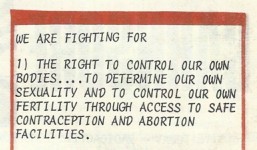
1980s and The Eighth Amendment
The early 1980s saw prominent anti- and pro-choice campaigns, leading to the 1983 referendum, which added a right to life of the unborn into the Irish constitution.
From 1980, an edition of Women’s View (published by Sinn Féin The Workers’ Party) notes the formation of the Women’s Right to Choose group in Dublin (Women’s View, No. 3. 1980. P. 5). It also includes a brief mention of the Northern Ireland Women’s Rights Movement’s opposition to a UK abortion amendment act proposed by John Corrie MP, which sought to restrict the 1967 Abortion Act (see p.4). A short article on enforced sterilisation of native American women also demonstrates the wider international context of reproductive rights campaigns (see p.26).
Abortion: A Choice for Irish Women, published the same year, sets out the case in favour of abortion from the Irish Women’s Right to Choose Group. This document addresses the context and arguments around abortion in Ireland, but also takes a practical approach of explaining and demystifying abortion with an assessment of the risks and first-hand accounts. It also includes practical appendices on methods of contraception and relevant contacts.
A further article from Women’s View, No. 4, looks at the role of the EEC in advancing women’s rights, arguing that “one of the most powerful weapons in the armoury of the women’s movement … has proved to be EEC directives”, and note the adopting of the 1981 report of the Ad Hoc Committee on Women’s Right by the European Parliament, despite opposition from Irish MEPs, and the media’ “hysterical preoccupation with just three paragraphs from the report relating to abortion”.
Also from 1981, Abortion Ireland, a report from Sinn Féin’s Department of Women’s Affairs, seeks to present the causes and context which lead to a need for abortion, in light of Sinn Féin’s anti-abortion policy. It quotes Sinn Féin’s policy document, Women in the New Ireland, which states:
There is a need to face up to the problem of abortion no matter what individual opinions are. We do not judge women who have had abortion but recognise that it is an indictment of society that so many women should feel the need to avail of abortion. We are opposed to the attitudes and forces in society that impel women to have abortions. We are totally opposed to abortion. Abortion Ireland, p. 2
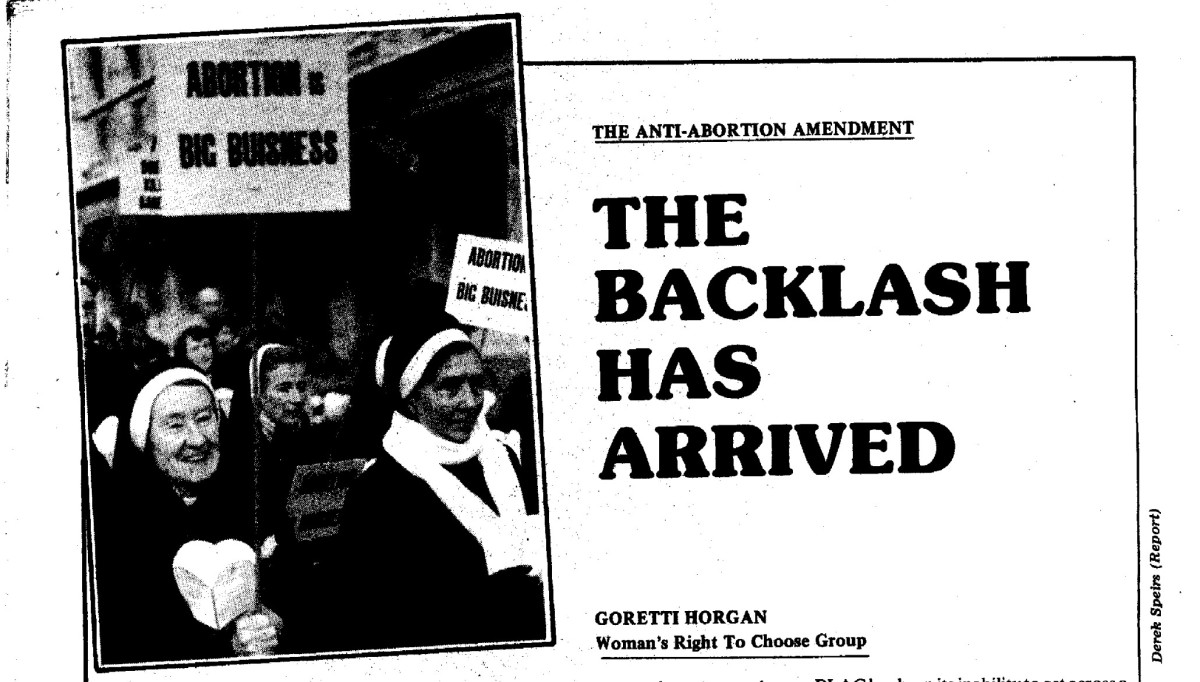
Gralton magazine, which was published from 1982-3, includes on-going coverage of the abortion issue. The second issue features a cover image of a pro-life march, and includes an article from Goretti Horgan for the Women’s Right to Choose Group on the upcoming abortion amendment (Gralton, No. 2, June/July 1982, p.12). Issue three includes another article from Horgan, “The Abortion Referendum: Where the Left stands”, as well as an anti-amendment campaign progress report from Mary Gordon (Gralton, No. 3, Aug/Sep 1982, p.4-5). Each subsequent issue includes further coverage and campaign updates, with abortion issue again featuring on the cover of issue 9. (We have not included all issues in this collection, but interested readers will find several issues with relevant articles on the Gralton page. See page 20 of issue 7 for a subject index of the first seven issues.).
Issue 9 of Women’s View, from a few months before the 1983 referendum, includes the text of Tomás Mac Giolla’s speech to the Dáil in opposition to the amendment, as well as an article outlining the Workers’ Party’s position, “Why we oppose the amendment”
The archive also includes a number of other publications from the period which address the amendment. Issue 10 of Church and State, published by Athol Books, includes an editorial entitled “A Roman Catholic Amendment” (Church & State, No. 10, 1982, p.1). The same issue includes an article entitled “Pregnant and Unmarried in Ireland - A True Story”, which provides a first-person perspective (see p.12) (it also prints details for the Woman’s Right to Choose Group and Irish Pregnancy Councelling Centre). Socialist Republic, from People’s Democracy, includes an article on the anti-amendment campaign, “A Chance to Re-organise” (Socialist Republic, Vol. 6, No. 2, 1983, p.5). The League for a Socialist Republic’s publication, Workers’ Republic, also includes a short article, “Amendment Can Be Defeated” (Workers’ Republic, No. 96, 1983, p.2).
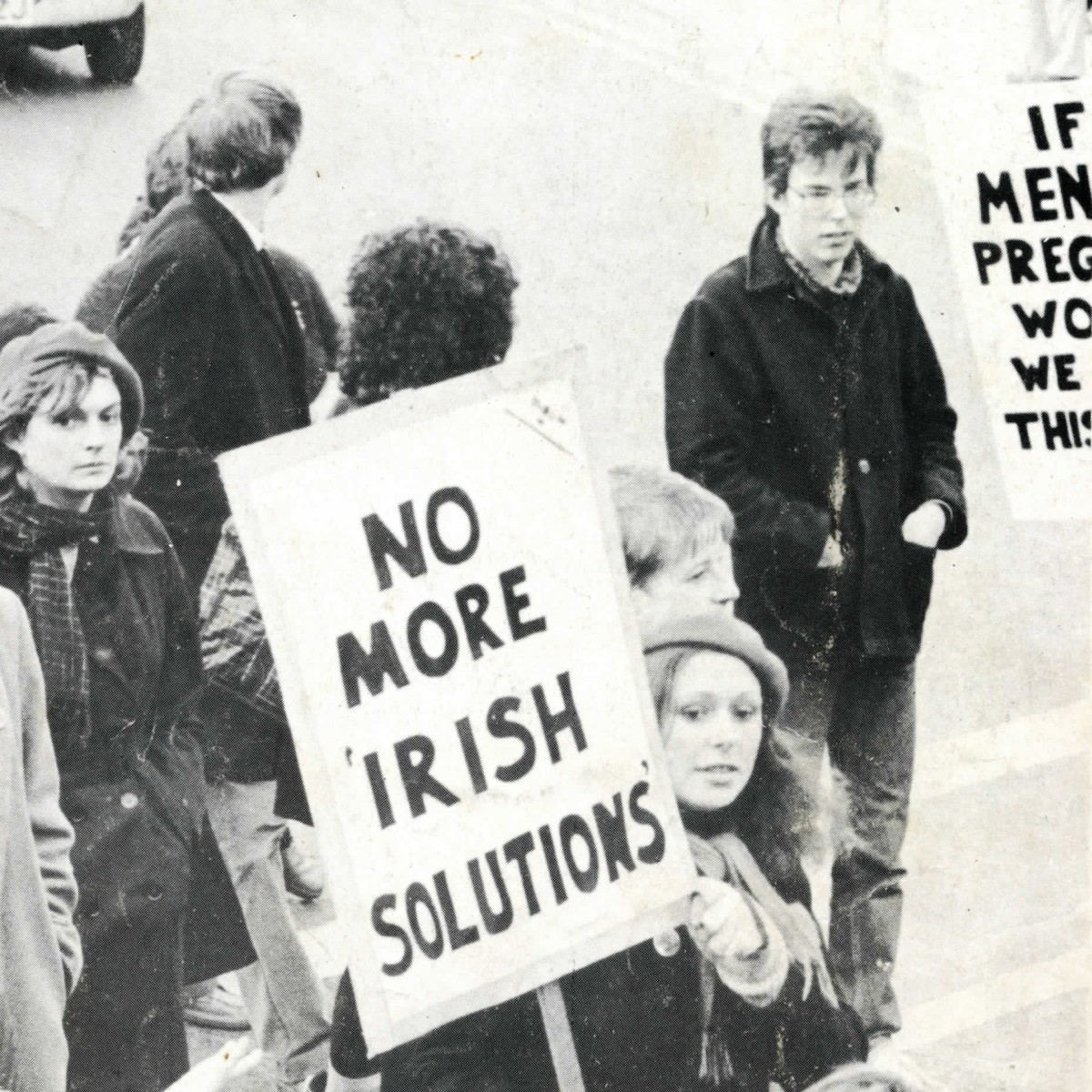
It is worth noting that contraception provision remained an issue - an article in Z magazine from 1989 provides an overview of the restricted access to contraception at that time, and outlines the gains made in the preceding decades.
1990s, the X Case and subsequent referendums
The X case judgement in 1992, which led to the establishment of the right to abortion information and the right to travel in subsequent referendums, as well as attempts to roll back the judgement, brought the abortion issue back to prominence.
From 1992, a leaflet headlined “Before you make up your mind…” from the Socialist Workers’ Party sought to set out the case for abortion to school students to counter the expectation that the catholic anti-abortion movement (such as the Society for the Protection of the Unborn Child (SPUC)) would mobilise in schools.
Sinn Féin’s policy document (from circa 1994) calls on the government to properly legislate for the 1992 referendums, and states that the party “accepts the need for abortion where a woman’s life is at risk or in grave danger, and in cases of rape or child sexual abuse” (Sinn Féin policy document, c.1994. p. 14).
From the Socialist Party, “Women & Socialist Politics”, from 1998, sets out their pro-choice position and calls for provision of abortion at least under the limited circumstances permitted by the X case judgement. Also from 1998 is an article published in Red Banner and written by Rosanna Flynn, entitled “It hasn’t gone away, you know: The fight for abortion rights” (Red Banner, No. 2, 1998, p.26).
The pro-choice position of the Socialist Workers’ Party is set out in their pamphlet Abortion: Why Irish Women Must Have the Right to Choose, written by Goretti Horgan. An updated 2002 edition of a pamphlet first published in 1982, it sets out the current status of abortion in Ireland and the socialist case for choice.
Finally, the first edition of Spartacist Ireland from 2002 includes an article on abortion in the context of the defeat of the 25th amendment referendum which sought to roll back the X case judgement (Spartacist Ireland, No. 1, 2002, p.20).
Repeal
In 2012, the death of Savita Halappanavar after she was refused an abortion led to widespread outcry and a renewal of campaigning to repeal the anti-abortion eighth amendment. The Snapshots of Political Action project includes materials from a vigil when news of her death was announced. It also includes leaflets from an Abortion Rights Campaign march in 2017, and an International Women’s Day march for choice, which took place in 2018, the day before the bill to repeal the eighth amendment was put to the Oireachtas.
Material in the archive from the referendum campaign includes a leaflet from Dublin North West Repeal, which precedes the calling of the referendum and the official campaign, and one from the Dublin North West Together for Yes group (Together for Yes was the umbrella organisation of political parties, civil society and campaign groups formed to campaign for a Yes vote to repeal the amendment). A newspaper from the Trade Union Campaign to Repeal the Eighth Amendment entitled “Yes Repeal” includes contributions from a wide range of left activists. There are also a number of posters from Éirígí calling for a Yes vote.
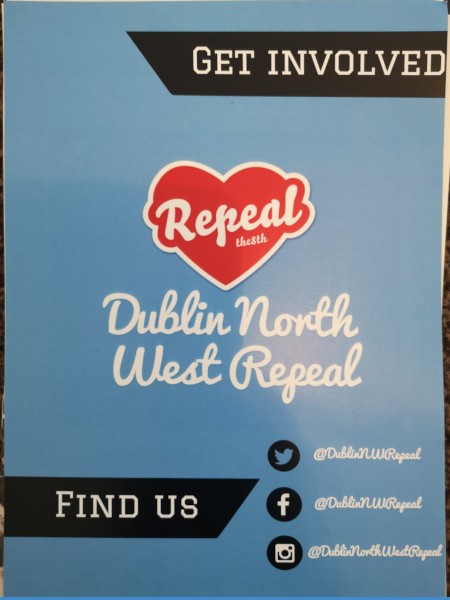
Opposition to abortion
While the further left has generally taken a pro-choice position on access to abortion, the documents in the archive do also contain dissenting voices on the issue.
Sinn Féin’s opposition to abortion in 1981 has been noted above, as has their support for legislation for the X case and provision of abortion in limited cases in 1994. Internal dissent on the issue is evident in the Clár agus Rúin from their 1986 Ard Fheis (see the proposals under ‘Women’, p. 45), with varying emphases proposed from recognition of the necessity of abortion to outright opposition.
An edition of The Other View from 2000 provides an interesting contrast in two articles on abortion. Dawn Purvis surveys attitudes to abortion in Northern Ireland, noting the prominence of religious attitudes in determining the issue for many, and arguing that public attitudes demonstrate a majority in favour of abortion provision in at least some limited cases. Noting the lack of common ground when the issue is presented from contrasting religious and secular positions, The Other View also presents a pro-life argument, but from a secular, feminist position, from ‘Feminists for Life’.
Hopefully the documents included here provide a useful look at the issues of abortion and reproductive rights on the left in Ireland. We are conscious of gaps in our coverage, and the collection will be updated as relevant documents are added. As ever, if any readers have relevant materials they can provide for inclusion in the archive, we would be very grateful.
-
For a broad outline of key events, articles on Contraception and Abortion in the Republic of Ireland are available on Wikipedia. For Northern Ireland, see the section in the abortion in the UK article. ↩
Documents
- 1976 — Banshee, Vol. 1, No. 4 Irish Women United
- 1975 — Socialist Republic, No. 1 Revolutionary Marxist Group
- 1978 — Women's Action, Vol. 2, No. 3 Belfast Women's Collective
- 1975 — The Bottom Dog, Vol. 3, No. 53
- 1976 — The Bottom Dog, Vol. 3, No. 60
- 1980 — Women's View, No. 3 Sinn Féin The Workers' Party
- 1981 — Abortion: A Choice for Irish Women Irish Woman's Right to Choose Group
- 1981 — Women's View, No. 6 Sinn Féin The Workers' Party
- 1981 — Abortion Ireland Sinn Féin
- 1982 — Gralton, No. 2
- 1982 — Gralton, No. 3
- 1983 — Gralton, No. 7
- 1983 — Gralton, No. 9
- 1983 — Women's View, No. 9 The Workers' Party
- 1982 — Church and State, No. 10 Athol Books
- 1983 — Socialist Republic, Vol. 6, No. 2 People's Democracy
- 1983 — Workers' Republic, No. 96 League for a Workers Republic
- 1989 — Z Magazine, No. 2
- 1992 — Before you make up your mind... Socialist Workers' Movement
- 1994 c. — Sinn Féin Policy Document Sinn Féin
- 1998 — Women & Socialist Politics Socialist Party
- 1998 — Red Banner, No. 2
- 2002 — Abortion: Why Irish Women Must Have the Right to Choose Socialist Workers' Party
- 2002 — Spartacist Ireland, No. 1 Spartacist Group Ireland
- 1986 — Sinn Féin Ard Fheis '86: Clár agus Rúin Sinn Féin
- 2000 — The Other View, No. 3
- 2017 — Repeal the Eighth - Dublin North West Repeal
- 2018 — Please Vote YES With Us on May 25 Together for Yes
- 2018 — Yes Repeal Trade Union Campaign to Repeal the Eighth Amendment
- 2018 — Abortion Is Already Here, Let's Make it Legal and Safe Éirígí
- 2018 — Choose Choice: Yes Éirígí
- 2018 — Tá an Ginmhilleadh Anseo Cheana Féin: Déanaimís Dleathach agus Sábháilte É Éirígí
- 2018 — Use Your Voice to Give Women A Choice Éirígí
External Resources
- Archiving Reproductive Health
Archiving Reproductive Health
A Digital Repository of Ireland (DRI) project archiving material from abortion and reproductive health campaigns, including the Abortion Rights Campaign, Together For Yes, The Coalition To Repeal the Eighth Amendment and others.
Comments
No Comments yet.
Add a Comment
Comments can be formatted in Markdown format . Use the toolbar to apply the correct syntax to your comment. The basic formats are:
**Bold text**
Bold text
_Italic text_
Italic text
[A link](http://www.example.com)
A link